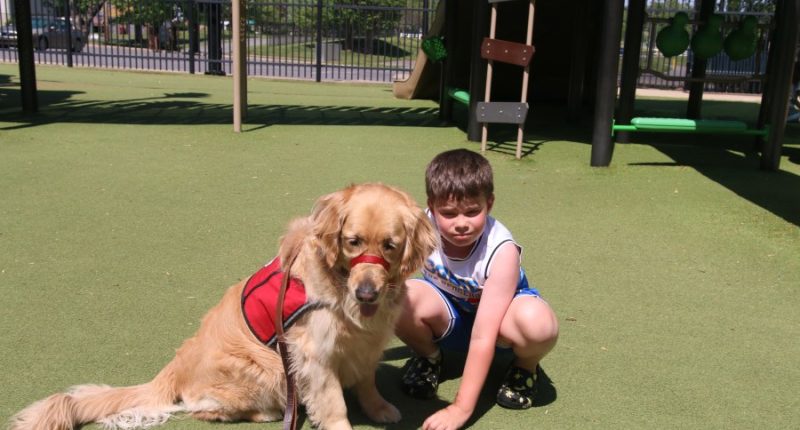Share this @internewscast.com

JOHNSON CITY, Tenn. ((WJHL) — Kylie Connelly is like many parents with autistic children who demonstrate “elopement” tendencies — always alert to her child’s location and safety, deeply concerned about how public schools manage the situation of children who may run away.
“I absolutely want him to be included when he attends school, and I hope that in a public school setting, he can interact with his peers and share the same experiences they do,” Connelly mentioned about her son Oliver, a 9-year-old third grader. “But often that doesn’t pan out, especially with the worry of his elopement and the school not necessarily being equipped to handle it.”
Elopement describes a reaction many autistic children have to a variety of triggers. Essentially, they bolt away, sometimes to hide, sometimes to wander.
“He very much likes to wander off,” Connelly said of Oliver, who is high functioning and currently doing math several grades above level at a private autism school in Johnson City. “He’s in his own world and there has been instances where he’s got away from us and we’re not sure where he’s at. And it’s terrifying.”
Jacki Wolfe said she understands Connelly’s concerns. Washington County, Tenn.’s Chief Student Supports Officer oversees special education at her district and said parents’ concerns are warranted — but that at least in Washington County, leaders strive to protect students and certainly to avoid the worst.
“It’s a school’s worst nightmare,” Wolfe said. “I mean, as much as we want to plan and be proactive and have eyes on students, you know, it does happen.”
News Channel 11 reported on a recent elopement at Kingsport’s Andrew Johnson Elementary School. On March 18, a 6-year-old kindergarten girl with autism ran from the school during a recess. She had been gone for close to 30 minutes and in a stranger’s care for about half of that when the stranger and the mother met each other on the street.
Seven staff remain reassigned to non-supervisory duties during the investigation, Kingsport City Schools (KCS) Assistant Superintendent Andy True confirmed Tuesday.
‘There’s not a teacher prep class for how to handle elopement’
Washington County has dodged the lost child bullet during Wolfe’s tenure there, but she did live through that experience when she was an administrator at KCS. She estimated about one in four children with autism displays elopement behaviors of some sort, which in Washington County totals somewhere around 50 kids.
“There’s not a teacher prep class for how to handle elopement,” she said. “We really have to work together as schools. It’s that hands on experience, we learn from each other and collaborate on best practices.”
Sometimes that includes learning the hard way. In Washington County’s case, the main focus areas are having adequate personnel, making sure those people know their roles, having the right physical structures in place — and working closely with families.
“Everybody knows their role,” she said. “If something comes over the intercom, then certain teachers are designated to step out and close fire doors or monitor their hallway … everybody plays their part in that plan as a school.”
There’s also simple logic, she said.
“If they know there’s an elopement risk, they’re trying to increase supervision during transitions or those less structured times at school, putting up visual barriers or visual cues like stop signs on the door, fences around playgrounds, alarms on door locks and things like that.”
The system also uses behavior intervention specialists who work with children to try and make their classroom experiences as positive as possible to try and decrease the incidences of elopement. Wolfe said good relationships with families are key in that effort.
“If they know there’s a risk of elopement, let your schools know so that we can be proactive in those situations,” Wolfe said.
“And it’s not just letting us know that there’s an elopement risk, but have you seen things that cause that elopement in your student? Is it when they get anxious? Is it when they get excited? Is it when they are in an unfamiliar place, or what are those triggers? Because then we can work together and really be proactive in strategies to prevent it.”
‘Significant amount of room for improvement’
Connelly said she understands the challenges schools face. Students with special needs often require extra and other time-consuming and expensive aids. And she knows elopement is a vexing problem, as it was when an incident at KCS proved the last straw for the family, at least at that point.
“He was in a class with 20 kids with one teacher, and if my son’s the one that’s running and she’s trying to watch him and all the others, she can’t do it all by herself,” Connelly said. “Or being outside on a playground that’s maybe not fenced, and they can’t always keep an eye on every child.
“So they do need the financial assistance to secure the playground or to get more assistants or aids to help the teachers keep an eye on those kids that are at a higher risk of eloping.”
But Connelly said a lack of resources isn’t the sole problem.
“I think there is a significant amount of room for improvement,” she said, pointing to some of the measures parents take and the frustrations some have expressed in getting the schools to accept those.
“There also needs to be less pushback when these kids need the extra assistance, whether that’s bringing in a service dog and helping them have an aid to facilitate the dog, or not push back on devices like the Angel Sense device.”
Oliver has a service dog, Mickey, that can help calm him and also track him if he runs and can’t be found. Angel Sense is an app many parents use to geolocate their kids. In fact, it’s how Crystal Stanley knew where to look for her daughter on March 18.
Integrating those helps can be an additional burden. The Angel Sense, for instance, has a feature that allows parents to listen to their children, which can cause school systems some privacy concerns.
“That may seem like a whole lot, but our child’s safety is is our top priority,” Connelly said.
She said Oliver is thriving at a private school, but she wants public schools to continue improving.
“His brain works a little different than ours and that brings things like me having to deal with meltdowns or the worry of elopement. He has a communication delay and a speech impediment. But I would not take away my son’s autism, because that has made him and shaped him into who he is.”
Connelly, who has two older children, said “he didn’t destroy my family, he was the piece that brought it together. He’s taught me patience and unconditional love.”
Wolfe said she believes schools can and will continue improving their service to children with special needs, including those with autism who elope. And she said appreciating people’s differences in the school setting benefits everyone.
“We really want to see that celebrated and when we do it does nothing but cause positive impact on academic achievement, on attendance, just on the overall school culture,” she said.











